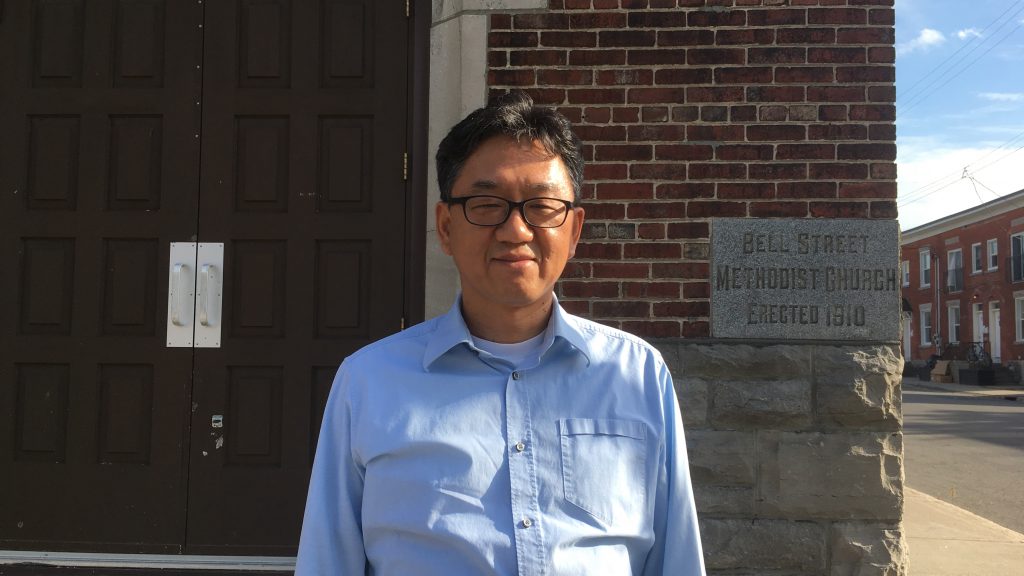Korean-Canadian pastor appeals for hope and peace amid nuclear standoff
By Haesun Jung
The pastor of a Korean-Canadian church in Centretown is expressing hope for a peaceful resolution of the ongoing nuclear standoff between the U.S. and North Korea while stressing the need for all sides to “talk it out” rather than resort to war.
Pastor Sukjae Kang’s appeal for “direct channels” of communication and a “conversation” between adversaries was echoed by calls for more diplomacy and dialogue by a Carleton University global affairs expert and the head of an Ottawa-based Korean advisory group.
Recently, North Korea has been raising tensions around Korean Peninsula with military threats using ballistic missiles and testing nuclear forces. As the tensions grow in the international security the Korean population, including those overseas, is closely watching the area with concern.
The Ottawa Korean Community Church on Arlington Avenue is a hub for Ottawa’s Korean-Canadian Christian population. With 450 attending members, the church makes the largest Korean community in Centretown.
Kang, pastor at the church since 2009, said that the theme of pastoral work he pursues through the congregation is peace. He described himself as part of peace-seeking denomination that emphasizes humanitarian values.
Kang said the congregation is concerned about the latest military threats emanating from North Korea, which he thinks might have crossed the “red line.” Korean-Canadians are fearful and “uncertain” about what North Korea’s intentions are, he said.
“It is too bad that we do not have any direct channels to North Korea for conversation, because we need to continuously talk it out with such a closed society like North Korea, where nobody knows what is happening inside,” said Kang, speaking in Korean.
Kang said that even among Korean-Canadians, opinions on how to deal with North Korea’s military threats are polarized between liberal and conservative views. He explained that young, liberal Koreans want more dialogue with North Korea to ease the situation, whereas older generations traumatized by the experience of the Korean War take a more conservative perspective on North Korea, even asking for a military response.
“I don’t try to merge the opinions,” said Kang. “We have to coexist…and what we do is at this church is to tell people to respect each other try to look forward than to be tied to the past.”
Brian Schmidt, a political science professor at Carleton University who specializes in international relations and security, said that a “firm, resolved deterrence policy” should be the next goal to de-escalate the tensions with North Korea, now widely believed to have viable nuclear weapons.
But Schmidt also mentioned the importance of “direct dialogue” with North Korea rather than “trying to go through some third party” such as China. “Deterrence only works if the threat is credible,” said Schmidt.
He asserted that the U.S. somehow needs to communicate to North Korea that it is willing to go to war in order to prevent North Korea from attacking the U.S.-defended island of Guam, Japan or mainland United States.
“If North Korea thinks it is a bluff, then maybe they will keep on engaging this action,” said Schmidt.
A “constructive dialogue” with North Korea is still important, added Robert Han, president of the Ottawa chapter of the National Unification Advisory Council, a South Korean constitutional organization that advises the government.
“In my opinion,” said Han, “the only reasonable option is a constructive dialogue between all parties and hopefully this dialogue leads to a peaceful resolution.”
Han said that he hopes that “a country like Canada, being a close ally of the U.S., can help to bring about a constructive dialogue — not only between the U.S. and North Korea, but all stakeholders in the region.”
Schmidt also pointed out that if North Korea were to attack the west coast of the United States, the radiation from thermonuclear weapons would also affect Canadian cities on the west coast.
“Canada has a foreign policy that privileges multilateralism, so (Canadian officials) could perhaps help negotiation if it were to take place, and try to induce caution amongst all the different actors involved — specifically the United States,” said Schmidt.
Kang added that conflict is not the answer.
“The solution for all is not a war but peace,” he said. “A war gives birth to another, and a nuke also gives birth to another. But it never leads to peace.”

